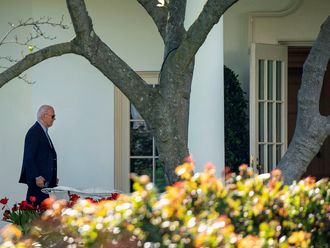San Francisco: On Wednesday, Twitter announced an end to political campaign and issue ads on its service, calling it an important step in reducing the flow of election-related misinformation. But some of its users might face an unintended consequence or two.
1. Public-interest nonprofits: Among those potentially affected could be public-interest nonprofits eager to reach an audience larger than their official followers, challengers to incumbent officeholders, and political consultants who make a living placing ad buys for their candidates. Political advertising makes up a small sliver of Twitter’s overall revenue. The company does not break out specific figures each quarter, but said political ad spending for the 2018 midterm election was less than $3 million (Dh11 million). It reported $824 million in third-quarter revenue. Candidates spend significantly more purchasing ads on Facebook than on Twitter, company records show.
2. Freedom of expression: Twitter CEO Jack Dorsey said the company is recognizing that advertising on social media offers an unfair level of targeting compared to other mediums. It is not about free expression, he asserted. “This is about paying for reach. And paying to increase the reach of political speech has significant ramifications that today’s democratic infrastructure may not be prepared to handle,” he tweeted. “It’s worth stepping back in order to address.”
3. Crippling issue-based ads: A ban on “issue ads” could limit the ability of many groups to reach wider audiences or disadvantage them in other ways. Ryan Schleeter, a spokesman for the environmental group Greenpeace, said a lot will depend on how Twitter defines “political”. What the group doesn’t want to see, Schleeter said, is major oil companies running “misleading, greenwashing advertising unchallenged” while “those who confront corporate power are censored”.
4. Limiting political challengers: Political challengers will also find likely find themselves at a disadvantage, since they don’t generally have the name recognition or money that their opponents do, said Matt Shupe, a Republican political strategist. “If you’re a challenger, advertising allows you to make up that difference,” he said. “It’s very hard to organically grow an audience for a state assemblyman campaign.”
5. No room for exceptions? Twitter said it will make some exceptions, such as allowing ads that encourage voter registration. It will describe those in a detailed policy it plans to release on November 15, and the policy will take effect November 22. Twitter will still allow politicians to freely tweet their thoughts and opinions. Trump’s Twitter feed in particular is known for often bombastic and controversial tweets that are shared widely. Federal campaigns are expected to account for the majority of advertising dollars on broadcast and cable channels during the 2020 election, according to advertising research firm Kantar.












